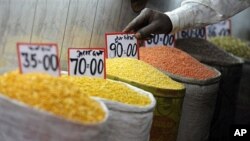India estimates that its economy will grow by more than eight percent, in the coming fiscal year. But there are concerns about high inflation, as food prices in the country climb at the fastest pace in more than a decade.
In an annual assessment of the economy released in parliament Thursday, the finance ministry says India has posted a "remarkable recovery" from the global recession.
Finance Minister Pranab Mukherjee says the sense of "despondency and gloom" associated with the economic downturn in the past year is finished.
"The economic survey has projected for the year 2010-11 our growth rate would be 8.5 percent plus, minus 0.25 percent," he said. "That means we began with a sense of uncertainty, the fiscal year, and we are ending it with a sense of confidence."
The economic report has an even more optimistic outlook for the future. It estimates that, in four years, economic growth could hit ten percent, making India the fastest growing economy in the world.
However the economic assessment also put the spotlight on the greatest worry confronting the government - high inflation. Inflation is particularly worrisome because it is largely triggered by high food prices
Prices of staples, such as lentils and rice, have soared in recent months after poor monsoon rains last year lowered farm output. The report warns that food inflation, which is presently hovering around 18 percent, could persist for a year.
The government has been under attack from angry opposition lawmakers because of the unprecedented rise in food prices.
On Thursday, the leader of the opposition in the lower house of parliament, Sushma Swaraj, said that high economic growth has no meaning for millions of poor people in the country for whom basic food items are becoming unaffordable.
Swaraj quotes the high prices of items such as rice, wheat, lentils, tea, sugar, and vegetables. She says all these items are crucial for the sustenance of poor people and not the rich.
Economists say the government is likely to take measures to tackle inflation when it presents its fiscal plan, Friday. But they say the dilemma for the government is to do so without hurting growth at a time when the economy is rebounding.
India Estimates 2010 Economic Growth




